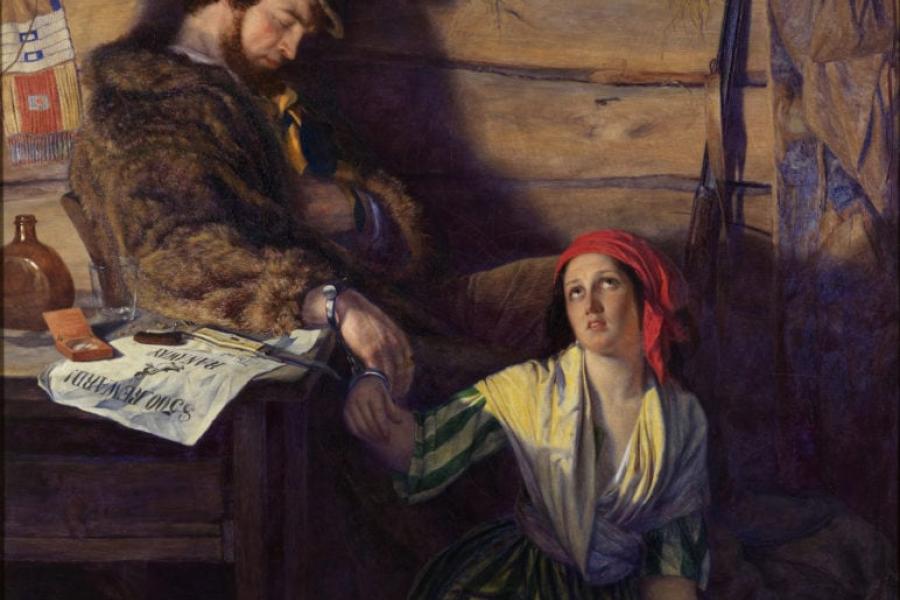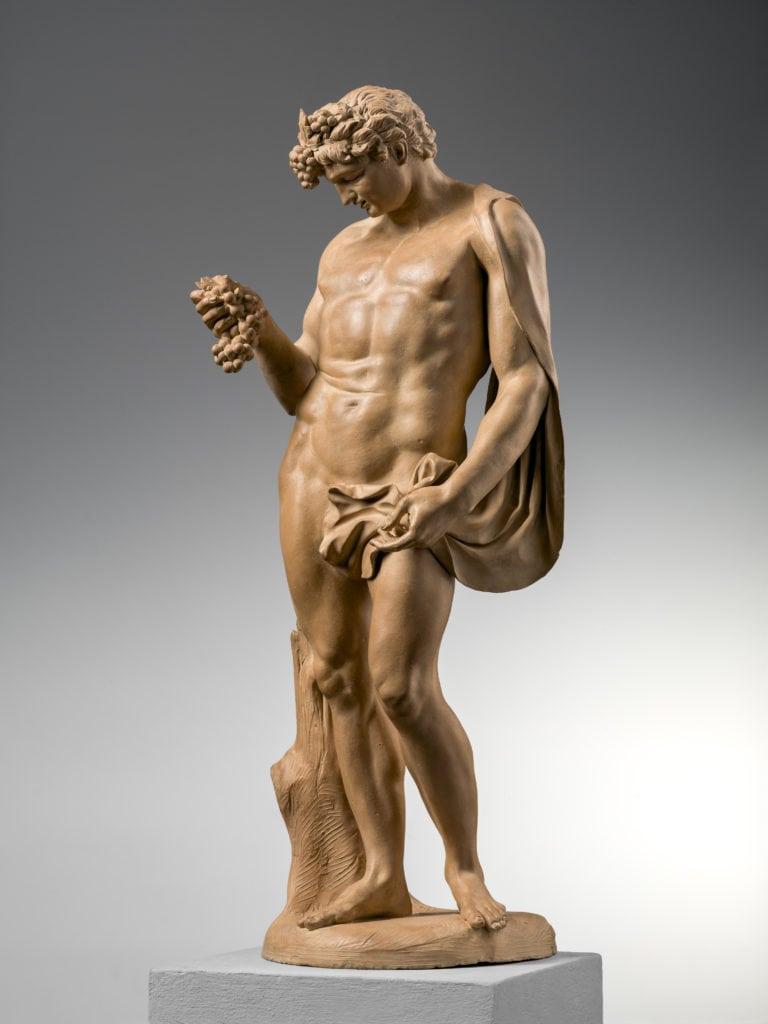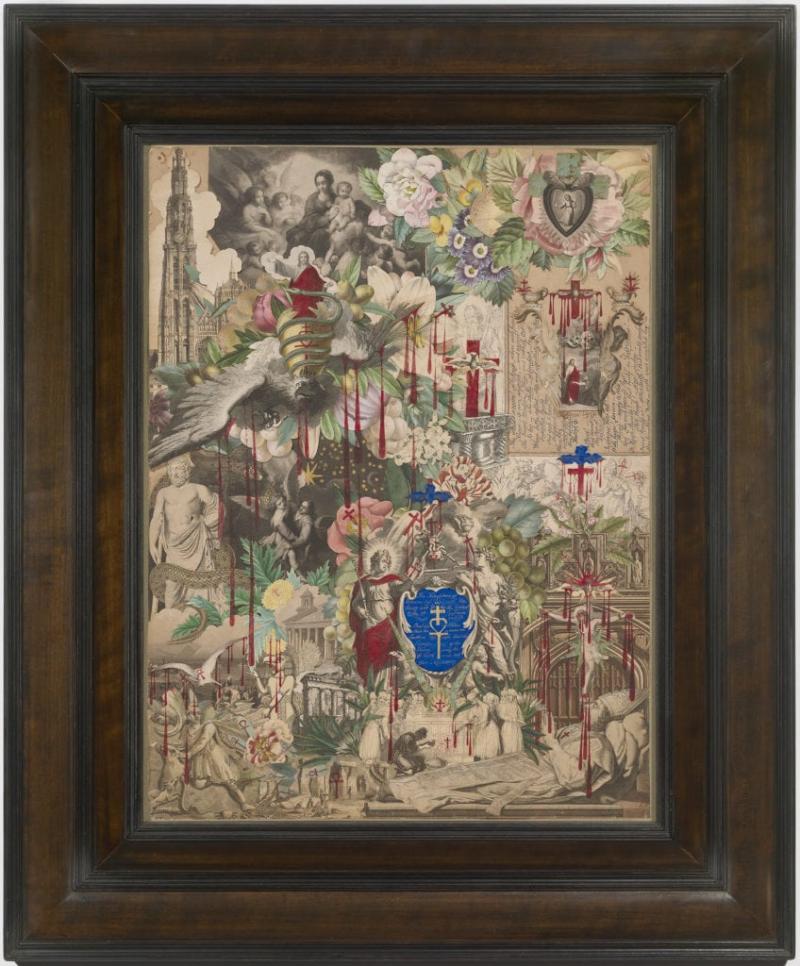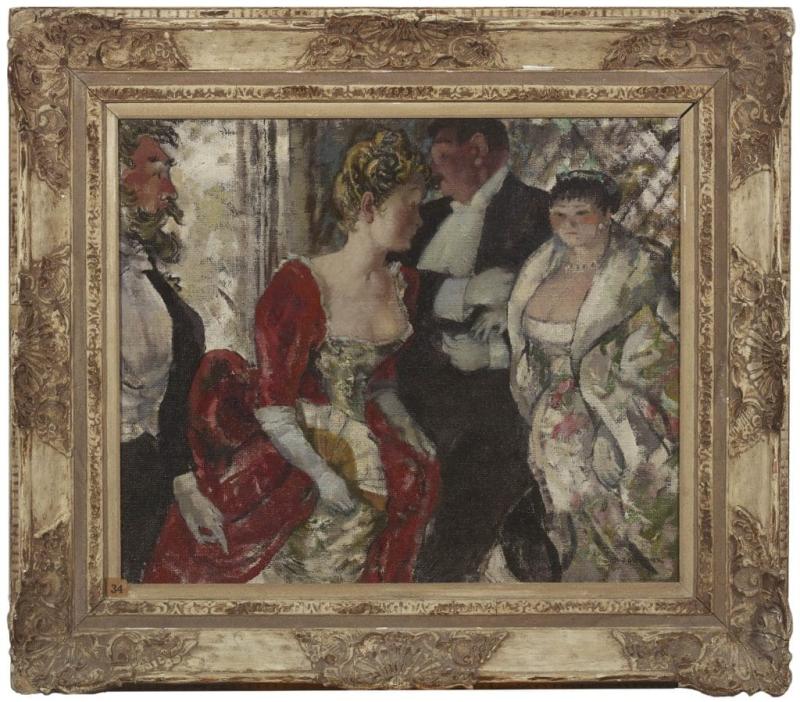New Faces Join London Art Week for Summer 2020 Digital Event 3-10 July 2020
 BEN ELWES FINE ART, William Gale (Britain 1823 - 1909) The Captured Runaway, 1856 Oil on canvas 125 × 96 cm. (49 ¼ × 37 ¾ in.) - Mit freundlicher Genehmigung von: londonartweek
BEN ELWES FINE ART, William Gale (Britain 1823 - 1909) The Captured Runaway, 1856 Oil on canvas 125 × 96 cm. (49 ¼ × 37 ¾ in.) - Mit freundlicher Genehmigung von: londonartweekWer: London Art Week
Was: Messe
Wann: 03.07.2020 - 10.07.2020
In response to the global Covid-19 situation, London Art Week has created a new online space for dealers to work together, preserving the collegiate nature of the event which embraces auction houses and which is supported by museum partners and art world sponsors. A major feature is a new series of mixed, curated Viewing Rooms where works from a cross-section of participants will be shown side by side, a new way for dealers to be discovered by a world-wide audience. The Viewing Rooms go live from 3-10 July, with an invitation-only Private View on 2 July.
Dealer pages on the London Art Week website will house up to 25 works per gallery, and there is provision in LAW DIGITAL for supporting material such as videos, film clips, essays and exhibition catalogues. At the time of writing, it is hoped some of the London-based dealers may be able to open their galleries too. A comprehensive digital catalogue will accompany London Art Week Summer 2020.
THEMES of HUMANITY AND PORTRAITUREThis summer, many exhibitions focus on the human form and there are many portrait highlights – perhaps life under lockdown has reminded us of the importance of the human face and the stories they mask or express. Lullo • Pampoulides, taking in- spiration from our current and unusual situation, is curating an exhibition of portraiture, In Silent Conversation: Portraits from the 16th to the 20th Centuries, while Galleria Carlo Virgilio & C. is showing Faces 4, a series of Italian self-portraits and portrait paintings, mostly of the early 20th century, all new to the market and selected for their quality and intriguing iconography. Sam Fogg presents Medieval Faces, which brings together some 40 artworks in sculpture, painting, stained glass and man- uscript illumination, all created by European artists during a period spanning the 13th to 16th centuries. Through this varied spectrum of objects, the show will aim to demonstrate how the interests and concerns of our medieval forebears, and their insatiable drive to capture the essence of human presence, are really no different from our own in today’s world.
New exhibitor Nicolás Cortés Gallery of Madrid has a wonderful c. 1575 Portrait of a Gentleman by Bartolomeo Passerotti (1529-1592) of Bologna, an example of the artist’s innovative ‘staged’ portraiture, in which the sitter is depicted ‘in action’. Portraits also feature strongly at Philip Mould & Company, returning to London Art Week after a few years, where highlights include works by Sir Anthony Van Dyck, Duncan Grant, Sir Peter Lely, and a captivating portrait of James Abbott McNeill Whis- tler, with the old Battersea Bridge and the Swan Tavern beyond, painted in 1869 by the artist’s friend Walter Greaves (1846-1930).
WOMEN IN ARTThere are several exhibitions featuring women artists: Ben Elwes Fine Art will present a painting by the Swedish artist Anna Katerina Boberg (1864-1935) who for many decades created work inspired by glaciers, the sea and the midnight sun particu- larly around the archipelago of Lofoten in the Norwegian Sea. Boberg even joined a scientific voyage funded by the Swedish Crown in 1911 and her resulting paintings went on tour to the USA in a special exhibit of Scandinavian art sponsored by Gus- tav V of Sweden and the crowned heads of Norway and Denmark.
Karen Taylor Fine Art presents an exhibition of British Women Artists, 1780-1890 – a Selection of Works on Paper. Karen says: “The work of women artists provides us with an important counterbalance in art history and its gradual emergence into the mainstream is to be celebrated. [Because they worked] outside the academic sphere, female artists have not received the attention bestowed upon their male counterparts.” She hopes “this small selection... will contribute a little to the current reas- sessment of their work.” Among artists featured is Augusta Innes Withers (1792-1877), botanical painter to Queen Charlotte and Queen Victoria, and painter to the Royal Horticultural Society, and Evelyn De Morgan (1855-1919), one of the stars of the recent Pre-Raphaelite Sisters show at the National Portrait Gallery.
FEATURE EXHIBITIONSNew participant Stuart Lochhead Sculpture has joined forces with Georg Laue, Kunstkammer Ltd. (London) to show an exhibition dedicated to The Studiolo: From Renaissance to Modern. The studiolo was a private space for the scholar and collec- tor to handle treasures, read books, study scientific instruments and contemplate the humanist world, and where collectors could share their knowledge and exchange ideas with fellow connoisseurs. This joint exhibition blends the old with the new in the way the Renaissance collector would have done, and shares the intimacy and private world of the studiolo with a wider audience. Highlights include an unique masterpiece of German bronze casting, in the form of an octagonal mortar with griffin head handles of c.1547, described as the chef d’oeuvre of Albert Hachman, the celebrated bronze founder from Cleves, and a rare sculpture by Théodore Géricault (1791-1824), cast in plaster after a wax model made by the artist in preparation for the Raft of the Medusa of 1819, in the Musée du Louvre, Paris.
Art and the Domestic Space is an exhibition by Trinity Fine Art which aims to recreate a domestic space of the Renaissance and Baroque eras, and featuring objects commissioned by families for their villas and palaces. One of the most important functions of art in a home was to exalt the standing of the family who lived there. Highlights include three portraits of a dy- nastic nature: two marble busts by Alessandro Rondoni (c.1644-1710) and a painting by Mario Balassi (1604-1687) from the collection of the noble Florentine Corsi family.
Stephen Ongpin Fine Art is celebrating nature and going back to the roots of drawing and inspiration in Drawn to Nature: Flora and Fauna from the 16th Century to the Present. Selecting natural history subjects from across 450 years, the exhibition, available to be viewed online and in their St James’s gallery in London, will consist of around 40 drawings and watercolours of natural history subjects priced between £1,000 and £150,000. It is accompanied by a fully illustrated digital catalogue, and includes the work of several living artists.
New participant Panter & Hall presents The Lost Drawings of Steven Spurrier. Steven Spurrier (1878-1961) was an artist, au- thor, poster designer and one of the most successful illustrators of his time, for over 50 years a regular contributor to the Illus- trated London News, The Sketch, The Radio Times as well as many other British, American and German publications. He was the first illustrator of Arthur Ransome’s classic book Swallows and Amazons. A collection of his paintings and drawings had lain forgotten in an old barn, and were only found by his family when the property came to be sold.
Osborne Samuel Ltd, the Modern British specialists taking part in their first London Art Week, will have two features for this Summer’s LAW DIGITAL presentation: rare prints by Paul Nash & C. R. Wynne Nevinson and their circle with a full digital cat- alogue and short film, and a Modern British Art exhibition focusing on major post war British sculptors and painters, including unseen works from the estate of John Craxton, important paintings and works on paper by Frank Auerbach, Leon Kossoff, Ben Nicholson, Ivon Hitchens, Victor Pasmore, Graham Sutherland, Keith Vaughan and Christopher Wood, in addition to the influential sculpture of Lynn Chadwick, Henry Moore and William Turnbull.
Sladmore Gallery returns to London Art Week; their chosen subject, inspired by current circumstances, will show a number of important sculptures which normally remain unseen in their collections but which have been leant by the gallery to inter- national museum exhibitions. Among major works is a group of reductions of The Burghers of Calais, reworked by Auguste Rodin (1840-1917) after the completion of the life-sized figures, and made for him by Lebossé between 1895 and 1903; only six groups of these reductions are known, two of which are in museums. The present group is currently in the Städel Museum in Frankfurt for the largest and most complete exhibition on Impressionist sculpture, with works from major museums on loan from across the world. The museum has just reopened and the exhibition has now been extended until the end of October.
Tomasso Brothers Fine Art is following a related thread, and presenting The Sculpture Museum: works after sculptures that are in museums around the world, bringing a piece of the museum to the viewer, given it is impossible to travel there in person right now. Highlights include a 17th century finely carved porphyry portrait of Emperor Trajan (governed 98 AD to 117 AD), celebrated by the Senate as Optimus Princeps, “the best ruler”. Carved in Rome, this head is closely related to a 2nd century AD white marble portrait of Trajan, now in the Louvre Museum, Paris and formerly in the renowned antiquities collection of the Albani family in Rome. The same collection held a second version of this composition, now in the Musei Capitolini, Rome.
HIGHLIGHTS – PAINTINGS & WORKS ON PAPERAmong individual highlights this year is a newly-discovered work by Cesare Franchi, known as Pollino (1560-1598) in pen, pencil and gouache on a gilded background – a beautiful depiction of the Crowning of the Virgin surrounded by a Female Saint, Angels playing music and Children dancing, c. 1590 – which Belgian dealer Klaas Muller will exhibit. In contrast, new exhibitor Galerie Canesso is showing Caravaggism and Tenebrism in Seventeenth Century Italy where among highlights are two masterful examples of chiaroscuro: in a work by Pietro Ricchi (1606-1675) depicting an intense game of coins called morra between two men; and another of Salome with the head of John the Baptist, by Francesco Rustici, called ‘Il Rustichino’ (1592-1626).
Lowell Libson & Jonny Yarker Ltd presents four remarkable mid-19th century collages, a group of extraordinary and almost hallucinatory works by John Bingley Garland (1791-1875), a successful merchant, pioneer Canadian politician, public servant and mysterious ‘outsider’ artist. He developed a technique of combining cut-outs from architectural and old master prints with natural history engravings, passages of scripture, découpage papers and ink crosses of various forms into bold and bi- zarre images, which he then elaborately and copiously decorated with drips of ‘blood’ in red ink. It is the addition of the blood which transforms these eclectic collages from the Victorian common place to proto-surrealist works of extraordinary power.
Guy Peppiatt Fine Art will show an unfinished sketch of The Matterhorn from the north-east, Switzerland by John Ruskin (1819- 1900); Ruskin inscribed the sketch ‘State of snow on Matterhorn in 1849’ which makes it one of the first detailed studies of the summit of the Matterhorn, a mountain that was not successfully climbed until 1865, and also shows Ruskin’s early interest in what we would now call ‘climate change’.
HIGHLIGHTS – SCULPTURE & WORKS OF ARTDesmet Gallery offers a magnificent and monumental (150 cm diameter) work by Giovanni Della Robbia (1469-1529/30), a frame in the form of a garland of fruit, vegetables and flowers, in polychromatic glazed terracotta dating to c1520-1525. Showcasing his Milan gallery at London Art Week for the first time, Walter Padovani, also an associate of Trinity Fine Art in London, has a rare, signed and beautiful terracotta with an interesting provenance by Canova’s neoclassical heir, Rinaldo Rinaldi (1793-1873). The sculpture depicts Peace and Justice Embracing, with a base showing the royal coat of arms. The work was formerly in the collection of Harewood House, home to the Earls of Harewood.
First-time exhibitor Enrico Ceci Cornici Antiche, frame specialists, offers an exquisite Sienese style Renaissance frame with unique gilding and tempera decoration. The outer edge is painted with recurring ivory and gilded leaves motifs. The inner section is decorated with relief-carved cartouches in Sansovino style, with a golden lion figure on a lapis lazuli-pigmented background, the whole dating no later than the mid-16th century. Benappi Fine Art has an unusual Orientalist style Bust of a Moor by Davide Calandra (1856-1915), one of the most prominent Italian sculptors of the late 19th and early 20th Century. The Moor was created during an early phase in Calandra’s career characterised by the execution of a number of busts focussed on a range of historical and mythical human figures. He pro- duced these in a range of mediums and presented them at The Italian Exhibition in London in 1888.
Joining London Art Week for the first time, Mireille Mosler, the New York-based gallerist in Old and Modern Masters, says: “I am really in favor of supporting an old master platform and see this as perhaps the only digital strategy in our field.” She adds, “ With the cancellation of all fairs this year, I want to support LAW DIGITAL, and our old master community, as we find new ways forward in the online world to connect with our international audiences.”
London Art Week Summer 2020 is grateful to sponsors Hunters Solicitors and Tectus Insurance Brokers for their support. Further news and developments for London Art Week Summer 2020 will be announced soon. Join the London Art Week community: register at www.londonartweek.co.uk to receive communications about Summer 2020.
Tags: Jan Brueghel d. Ä., Malerei, Meisterwerke, Paul Jenkins, Peter Paul Rubens, Serge Ivanoff, Skulpturen BENJAMIN PROUST FINE ART LTD Attributed to Carlo di Cesare del Palagio after a model by Adrien de Vries (Florence & The Hague 1540 & c. 1556 - Italy & Prague c. 1598 & 1626) Nymph, c. 1590-93 Bronze 34.5 × 21.5 × 15.5 cm. (13.59 × 8.47 × 6.1 in.) POA - Mit freundlicher Genehmigung von: londonartweek /
BENJAMIN PROUST FINE ART LTD Attributed to Carlo di Cesare del Palagio after a model by Adrien de Vries (Florence & The Hague 1540 & c. 1556 - Italy & Prague c. 1598 & 1626) Nymph, c. 1590-93 Bronze 34.5 × 21.5 × 15.5 cm. (13.59 × 8.47 × 6.1 in.) POA - Mit freundlicher Genehmigung von: londonartweek / Wer: London Art Week
 STEPHEN ONGPIN FINE ART Herman Henstenburgh (Hoorn 1667 - 1726) A Sun Conure Parrot and a Yellow-Backed Oriole, c.1685 - 1720 Gouache and watercolour on vellum 301 × 204 mm. (11 ⅞ × 8 in.) POA - Mit freundlicher Genehmigung von: londonartweek /
STEPHEN ONGPIN FINE ART Herman Henstenburgh (Hoorn 1667 - 1726) A Sun Conure Parrot and a Yellow-Backed Oriole, c.1685 - 1720 Gouache and watercolour on vellum 301 × 204 mm. (11 ⅞ × 8 in.) POA - Mit freundlicher Genehmigung von: londonartweek / Wer: London Art Week
 CHARLES BEDDINGTON LTD Antonietta Brandeis (Myslkovice, Czech Republic 1848 - Florence 1926) Rome: On the Palatine Hill, c. 1890's Oil on panel £18,000 - Mit freundlicher Genehmigung von: londonartweek /
CHARLES BEDDINGTON LTD Antonietta Brandeis (Myslkovice, Czech Republic 1848 - Florence 1926) Rome: On the Palatine Hill, c. 1890's Oil on panel £18,000 - Mit freundlicher Genehmigung von: londonartweek / Wer: London Art Week
Events, Exhibitions and Discussions Exploring Art from Antiquity to the 20th CenturyThursday, 29 November to Friday, 7 December 2018
 BRUN FINE ART Giuseppe Maria Mazza (Bologna 1653 - 1741) Bacchus, First Quarter of the 18th Century Terracotta Height: 64 cm. (25 ¼ in.) - Mit freundlicher Genehmigung von: londonartweek / London Art Week
BRUN FINE ART Giuseppe Maria Mazza (Bologna 1653 - 1741) Bacchus, First Quarter of the 18th Century Terracotta Height: 64 cm. (25 ¼ in.) - Mit freundlicher Genehmigung von: londonartweek / London Art Week LOWELL LIBSON & JONNY YARKER LTD John Bingley Garland (1791 - 1875) The Blood Collages, c. 1850-60 Collage of engravings and gold paper with gouache and gold paint with extensive inscriptions in pen and ink on buff backing paper 520 × 390 mm. (20 ½ × 15 ⅜ in.) - Mit freundlicher Genehmigung von: londonartweek / London Art Week
LOWELL LIBSON & JONNY YARKER LTD John Bingley Garland (1791 - 1875) The Blood Collages, c. 1850-60 Collage of engravings and gold paper with gouache and gold paint with extensive inscriptions in pen and ink on buff backing paper 520 × 390 mm. (20 ½ × 15 ⅜ in.) - Mit freundlicher Genehmigung von: londonartweek / London Art Week PANTER & HALL Steven Spurrier RA RBA ROI (London 1878 - 1961) In the Nineties, 1948 Oil on canvas board 51 × 61 cm. (20 × 24 in.) £4,850 - Mit freundlicher Genehmigung von: londonartweek / London Art Week
PANTER & HALL Steven Spurrier RA RBA ROI (London 1878 - 1961) In the Nineties, 1948 Oil on canvas board 51 × 61 cm. (20 × 24 in.) £4,850 - Mit freundlicher Genehmigung von: londonartweek / London Art WeekCopyright © 2025 findART.cc - All rights reserved



